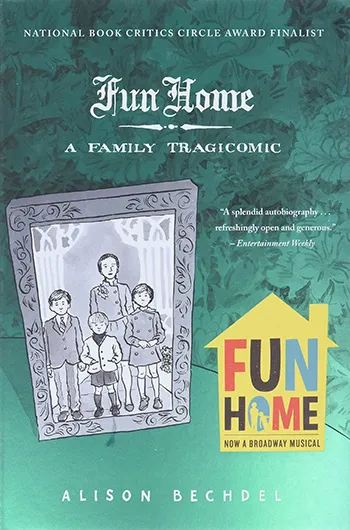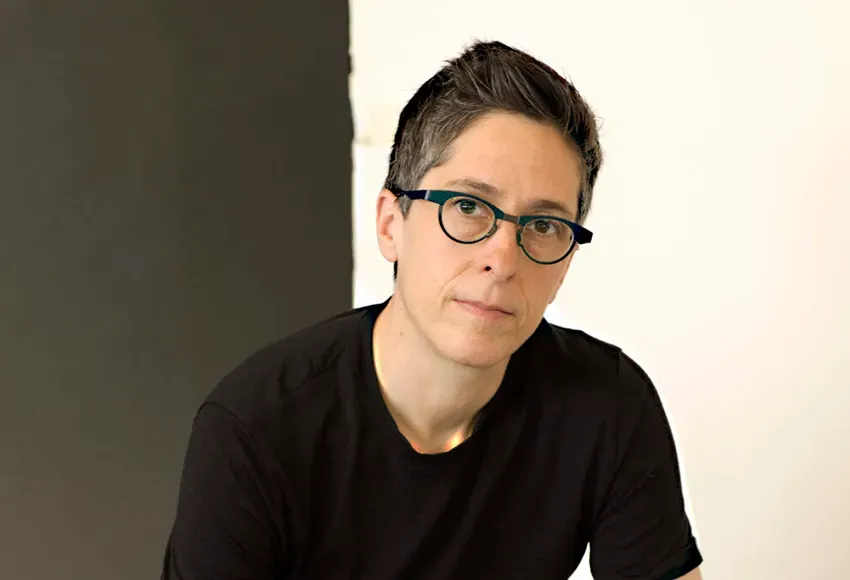SGN Book Club explores LGBTQIA+ literature, new and old, from the fresh perspective of a Gen Z book enthusiast. Fun Home was originally published in 2006.
Alison Bechdel has become somewhat of a household name among Queers. Whether you associate her with the '90s comic strip "Dykes to Watch Out For," are familiar with the feminist "Bechdel test," or know her as a 2014 recipient of a MacArthur "Genius Grant," odds are you've heard her name.
This week, our book club is looking at the Alison behind her years of successful writing, awards, and legacy by reading her graphic memoir Fun Home: A Family Tragicomic.

Packed with philosophical and literary references and at times humorous and fun, Fun Home is the illustrated story of Bechdel's wacky childhood, in which she walks readers through the unique locations of her early life – from the antique house her father meticulously kept to the funeral home her family spent most of their time working in.
Despite the gilded (and at times morbid) locations she grew up in, Bechdel notes that childhood was not always carefree and fun. She brings readers into the reality of living under her father's strict tyranny. From the vantage point of an adult, Bechdel provides some leniency toward her father's strange hobbies, but at the same time condemns him as a monster for the secrets he kept.
A complex father
While she takes her time revealing the central conflict of her memoir, Bechdel ultimately informs her readers that her father died, likely of suicide, only a few months after she came out to him. As she delves further into her relationship with him, Bechdel reveals that he was a closeted homosexual himself, a factor that likely played a role in his death.
Bechdel analyzes her father's life from several different perspectives. At times, she sees his existence as a tragedy and wonders who he might have been if he had been able to live his life authentically. She recalls her own early experiences with Gay men and wonders if her father would have been happy living in post-Stonewall New York.
However, most of her analysis of her father is critical. Early on, she notes that he was a predator. A high school teacher, he preyed on vulnerable young boys, sleeping with his students, his children's male babysitter, and old friends from the army. She sees her father as a coward, afraid of those who might prey on him if he were to have left the closet, but simultaneously preying on others.
As she analyzes her childhood through adult eyes, Bechdel also develops a sense of pity for her mother. While she discloses that she does not actually know whether her father was Gay or Bisexual, his relationship with her mother was convoluted. In letters the two exchanged while he was away at war, it seems Bechdel's father may have truly loved his wife. However,
Bechdel often wonders whether he loved her or the idea of romance, something he may have never gotten to truly experience.
Bechdel questions not only her father's capability to love his wife but also her own relationship with him. She recalls a childhood of gender nonconformity. In her illustrations, she is always seen with a boyish crew cut, matching those of her younger brothers. In one panel, she recalls her father's anger and violence when she, at just four years old, refused to wear a barrette in her hair.
Bechdel often wonders whether her father loved her as his daughter, or as a way for him to perform femininity through her as a surrogate body. Through this interpretation, the antique house Bechdel lives in becomes a metaphor for young Alison's identity.
The fun home, a metaphor for autonomy
In the first chapter, Bechdel shows readers that her father was the czar of the home, never letting anyone else choose how they would decorate their spaces. Her room was full of antique decorations and furniture, feminine wallpaper, and old-fashioned outfits. Any attempt she made to decorate her space with items of her own interests was met with punishment.
The repercussions of her father's policing of Bechdel's gender expression left her confused about her own identity and desires. Toward the middle of the book, she recalls an encounter at a diner. While getting lunch with her father, young Alison spots a butch Lesbian for the first time and becomes enamored of her. Her father expresses disgust toward the woman and accuses his daughter of wanting to be like her.
The disdain her father shows for the masculine woman is reflective of a greater sense of misogyny and lesbophobia expressed by the Gay community at the time. It also reflects a sense of shame he projected onto other members of the LGBTQ+ community for their ability to be out. This sense of shame was harbored by Alison, especially in the years following her father's death, as she wondered just how her own coming out may have influenced his emotional state.
While the book focuses on Bechdel's relationship with her father, she also discusses how her mother responded to her coming out. After writing a letter home from college telling her parents she was a Lesbian, her mother was upset. On the surface, her mother's disdain and rejection could be interpreted as homophobia. However, Bechdel takes readers deeper into the dynamics of her family, revealing the mistreatment her mother received at the hands of her father, as well as his infidelity.
Through her beautiful illustrations and in-depth storytelling, Bechdel explores the complexities of queerness. Despite the lack of colors in her novel, she demonstrates that no action is entirely black or white. She leaves her readers to form their own opinions about her family and shows that each adult she grew up with was full of their own complexities.
Fun Home is an essential read for anyone who finds themselves intrigued by the historical legacy of queerness, the dynamics of family, or the complexities of identity.


